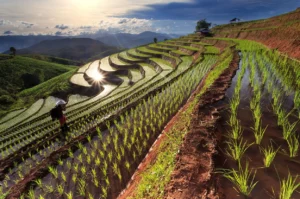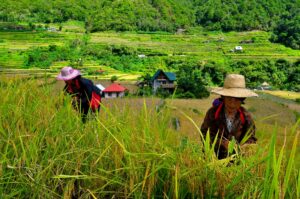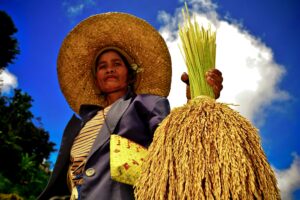
In Lao PDR, rice production is an important livelihood of 724,000 farmers. Rice production is an important livelihood of around 724,000 farmers in Lao PDR, whose rice sector is rapidly transforming from pure subsistence to more commercial production. Rice farmers who sell their produce increased from 6% in 1998-99 to 30% in 2010-11. Generally, rice is produced by small farm households with an average farm size of less than 2 hectares. Although rice farming in Lao PDR is small-scale, its average size of rice holdings has increased over the last 12 years. Almost 90% of the rice area in Lao PDR is rainfed, predominantly in the lowlands. Rice remains the staple food for Lao PDR and glutinous rice is the most popular type of rice—more than 90% of the rice produced is glutinous. Lao PDR also appears to be the center of biodiversity for glutinous rice and has one of the highest concentrations of biodiversity of rice in the world.
Lao PDR and IRRI
Lao PDR-IRRI collaboration began in the late 1960s. This continued in the 1970s with the testing of improved rice breeding material from IRRI’s rice breeding and selection work in Lao PDR. Systematic multilocation yield trials followed by the multiplication and dissemination of several IRRI lines and varieties to farmers took place in 1973.
The first memorandum of understanding between Lao PDR and IRRI was signed in 1987. Heightened collaborative work began when the Swiss Agency for Development and Cooperation (SDC) supported the Lao PDR-IRRI Research and Training Project from 1990 to 2007. This project aimed to improve and strengthen rice research capacity within the country.
 On 12 January 2007, Dr. Sitaheng Rasphone, Lao PDR minister for agriculture and forestry, and Dr. Robert Zeigler, IRRI director general, signed a memorandum of understanding to establish a regional hub in Lao PDR; thus, the IRRI-Greater Mekong Subregion office in Lao PDR was formally opened. The office has since become the IRRI-Lao PDR office.
On 12 January 2007, Dr. Sitaheng Rasphone, Lao PDR minister for agriculture and forestry, and Dr. Robert Zeigler, IRRI director general, signed a memorandum of understanding to establish a regional hub in Lao PDR; thus, the IRRI-Greater Mekong Subregion office in Lao PDR was formally opened. The office has since become the IRRI-Lao PDR office.
To intensify Lao PDR-IRRI collaboration, foster new partnerships, and strengthen current ones, IRRI held a consultation workshop on 26 October 2011 in Vientiane, with government researchers, scientists, extension workers, policymakers, and donors in the rice sector. The workshop defined areas of collaboration to start and strengthen, including the improvement of seed production practices and the testing and establishment of public-private partnership models for disseminating agricultural technologies. IRRI has had at least 13 staff members posted to Lao PDR. Two internationally recruited staff are presently posted there: Dr. Benjamin Samson, agronomist and representative to Lao PDR, and Dr. Rubenito Lampayan, water management specialist. On 11 May 2012, his Excellency Thongsing Thammavong, prime minister of Lao PDR, visited IRRI headquarters in the Philippines. IRRI’s work in Lao PDR is supported by the International Fund for Agricultural Development, SDC, the Bill & Melinda Gates Foundation, the Australian Centre for International Agricultural Research, the government of Japan, and Germany’s Federal Ministry for Economic Cooperation and Development.
Current research and development activities with Lao PDR
Helping farmers in uplands. Through the Consortium for Unfavorable Rice Environments, IRRI is helping farmers in Lao PDR’s northern mountain region upgrade their agricultural practices and find varieties that suit their environment and minimize environmental impacts on this fragile environment. Helping farmers in irrigated areas. As part of the Irrigated Rice Research Consortium, IRRI is helping farmers in irrigated areas adopt beneficial post-production processing and water management technologies. Helping farmers in southern Lao PDR. For farmers in rainfed regions in southern Lao PDR, IRRI is developing improved soil, nutrient, water, and crop management technologies to improve the livelihoods of rural people. Breeding better rice varieties. IRRI is developing varieties with beneficial traits, such as drought and submergence tolerance, that are important for Lao farmers and that suit different growing regions and conditions. Coping with climate change. IRRI is collaborating with Lao PDR researchers to test seasonal weather forecasting, adapt crop management systems, and produce decision support systems. These information resources and tools will help farmers cope with climate change. Better grain quality and value. Under the Grain Quality Improvement Network, IRRI is enhancing the aroma of Lao PDR grown rice to help improve its quality, value, and export appeal. Sharing knowledge. IRRI is helping to further develop the Lao PDR Rice Knowledge Bank—an online repository of effective and practical best management practices for rice production.
Key achievements in Lao PDR
Conserved Lao PDR’s rice genetic diversity. Lao PDR has deposit more than 15,000 types of rice in IRRI’s International Rice Genebank, making the country the secondlargest contributor. In turn, IRRI has dispatched 750 rice samples to Lao PDR for breeding and other research, and restored more than 11,000 types. Improved rice production. Total rice production in Lao PDR increased from 1.5 million tons in 1990 to more than 2 million tons in 1999, at which time the country achieved rice self-sufficiency, while the SDC-supported Lao PDR-IRRI project was under way. Current rice production exceeds 3 million tons. Modern rice varieties adopted. By 2004, modern rice varieties had been adopted in Lao PDR by 80% of the farming households and on 69% of the land planted to rice. Rice varieties developed with IRRI accounted for 51% of the planted modern varieties and included TDK1 and 5, and PNG 1 and 2. A 2008 study showed that 87% and 67% of farmers, inside and outside, respectively, of the major rice-growing plains of Lao PDR grew improved glutinous rice varieties. Improved crop management practices. Researchers developed and adapted a seven-step best management practice manual and poster for rainfed lowland rice, which covers variety selection, good seed production, land preparation, crop and field management, harvesting, and storage. Supported rice science in Lao PDR. IRRI has contributed to a fully functional national rice research system in Lao PDR, hosted 60 Lao scholars, and trained 179 people from Lao PDR in short courses. Currently, Mr. Phetmanyseng Zangsayasane from Laos is completing his PhD with IRRI and Khon Kaen University.








